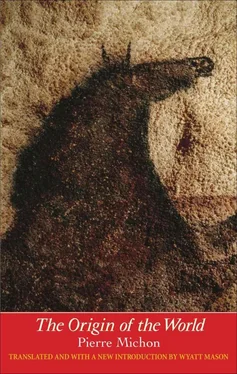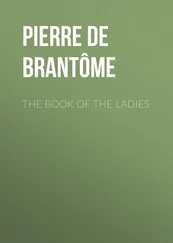And, anyway, the story of an actual Michon book being waylaid was absolutely true. The book you have in your hands, for example, announced in 1991, arrived five years late, in 1996. When it did, it ran a skimpy ninety-six pages. No publisher was to blame this time, only the author, if one can blame a writer for taking the time, or having to, upon which quality depends. During that five-year gap when nothing appeared and Michon fell publicly mute, the title of the book as announced and awaited, L’Origine du monde —what a title; what a promise — was poached by another author. Michon renamed his novel, with some regret, La Grande Beune .
The Beune: a fourteen-mile-long river, in southwest France, in Dordogne. If we know Dordogne at all, it is by association with the names Font-de-Gaume, Grotte de Vil-lars, Les Eyzies, Lascaux — four of the most famous European caves containing Paleolithic paintings by our forebears. Thousands of early human artworks hidden under the earth on those walls, instance after instance of the attempt to fix figures in paint. Lost masterpieces. The sorts of things that, given the inconvenience of painting below ground by torchlight, given the astonishing fineness of the images found there, you would leave there only if driven to do so, driven by some inner urge, some turbulence.
But if you didn’t have the skill to leave such a mark on the world, that urge might be there nonetheless. It would find its outlet elsewhere. Its turbulence, its inexpressibility, beats at the heart of Michon’s Origin of the World , his only fiction to date not based on historical fact, not based in the exhumation of a single figure’s life from out of the death that befalls him in stories. Rather, it is about something larger, stranger. Not an attempt at reconciling man with myth, it is, itself, a myth, one about the original urge, first told in Genesis 2, when Adam names the animals, and God looks on, delighted and proud, at his creation’s powers. Expressed on walls and expressed on flesh, Michon’s little novel tells the story of the marks that humans make or can’t, and the violence that licenses our essentially human savagery.
The Earth slept naked and tormented like a mother whose bedcovers have slipped away.
ANDREI PLATANOV
Between les Martres and Saint-Amand-le-Petit lies the town of Castelnau, along the Beune. I was posted to Castelnau in 1961: devils are posted as well I suppose, to their Circles below; and somersault after somersault make their downward way just as we slip gently toward retirement. I hadn’t fallen yet, not exactly, it was my first post, I was twenty. There’s no train station in Castelnau; it’s long gone; buses leaving Brive or Périgueux early in the morning drop you there at the end of the line very late at night. I arrived at night, in something close to shock, in the middle of a galloping September rain that bucked in the beams of the headlights, in the pounding of the long windshield wipers; I couldn’t see the village at all, the rain was black. I took a room Chez Hélène , Castelnau’s only hotel, perched on the lip of the cliff beneath which the Beune flows: that night, I couldn’t yet see the Beune, but leaning out the window of my room, I was just able to make out a hollow in the darkness behind the hotel.
Three steps took you down into the bar; it was painted that blood red once called rouge antique; it smelled of saltpeter; between long silences, a scattering of seated drinkers spoke loudly of gunshots and fishing; their movements in the low light cast their shadows over the walls; if you looked above the counter you would see a stuffed fox staring out at you, its pointy head turned violently your way but its body running along the length of the wall, as if in flight. The night, the creature’s eyes, the red walls, these people’s rough talk, their archaic words — all of this sent me back to some uncertain, pleasureless moment past, filled me with a vague fear that was compounded by the fear of soon having to face my students: this past seemed to be my future, these shady fishermen whose captains were loading me onto the rickety raft of adult life and who, reaching the river’s middle, were stripping me and throwing me to the bottom, snickering in the darkness, in their beards, in their bad patois; later, they would squat along the banks and wordlessly scale enormous fish. September’s bewildered rain was beating the windows. Hélène was as old and massive as the Cumaean sibyl, as pensive, but all dolled up in nice old clothes, her hair in a scarf; her fat arm and its uprolled sleeve wiped the table in front of me; her least movement radiated pride, a silent joy: I wondered how she’d come to run this red tavern presided over by a fox. I asked her for some dinner; she apologized modestly, for her ovens that had gone cold for the night, for her advanced years, and then served me a profusion of cold morsels that pilgrims and soldiers in stories are forever filling up on before their bodies are run through with swords, as they cross a black ford full of blades. And wine, in a fat glass, to better brave these blades. I ate these haute-époque cold cuts; at the neighboring table words came infrequently; heads drew nearer, heavied with sleep or the memory of animals about to pounce, dying; these were young men; but their fatigue, their hunts, these were as old as fables. My Wallachian brigands at last donned their hats, stood, and in their inky black oilcoats whose broken folds gleamed moved off bravely to perform the strange orders of boatmen, of the sleeping world; one of them, above his starry greatcoat, had turned his finely featured face toward me; he offered a complicitous smile, or perhaps it was only pity; either way, his teeth shined a bright white. You could hear the mopeds starting up. Through the open door, the night was turbid, moveless: the rain was galloping elsewhere; there was fog. “It’s Jean the Fisherman,” Hélène said, with a little nod of her head toward this fog through which the shrill motors flew; her gesture was so vague that she could just as easily have been naming the fog. She smiled. The wrinkles in this smile sorted themselves out perfectly. She shut the door, fiddled with some switches, the lights went out; rising, I was already asleep; I was anywhere, in lands where foxes run through dreams, in the heart of a fog of fish one doesn’t see leap from the water, falling back in with a hard flat noise, at the very bottom of Dordogne, which is to say nowhere, in Wallachia.
It rained all of September.
My students weren’t monsters: they were children who were afraid of everything and laughed for no reason. They had given me the little class, not the smallest but the elementary level; it was composed of many little bodies that all looked alike; I learned how to name them, to recognize them during recess as they ran through the rain to the windy hollow beneath the covered playground; I would observe them from behind the high windows of the room, and then all of a sudden I wouldn’t see them anymore; they would be huddled under an awning, beneath the blithe bodies of falling rain. I was alone in the classroom. I looked at a long row of pegs from which their car coats hung, still steaming from the morning rain as if drying in some bivouac, the belongings of a dwarf army; I named even these little castoffs, said them aloud with some emotion. And of course there were big blackboards on the walls bearing letters and syllables, words and phrases flanked by drawings, posters, all the predictable imagery, the naïve nothings that charm young hearts, hook them, while flogging them with times tables that make them cry beneath these innocuous lures, pictures of plump little boys laughing, of young girls with braids, of rabbits. Children move their feet when they think, when they cry: I could see the traces of this careful, sad dance beneath their desks, little circles of mud; and large inkblots on the white wood testified to the same rhythm, to the same piety. Yes, this moved me; I wasn’t much older than they, I was twenty; and I was drifting away, I was barely even there.
Читать дальше












